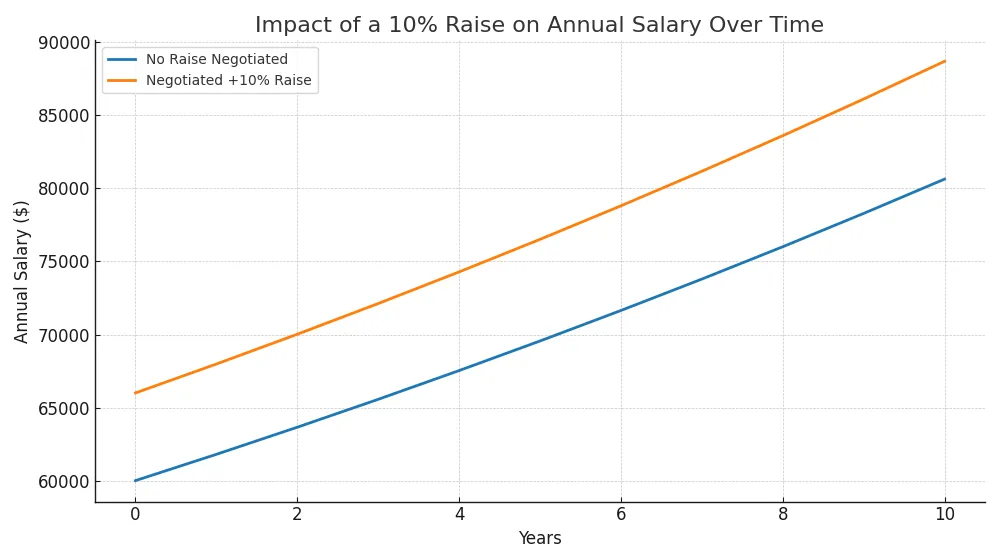Salary Negotiation: Scripts, Tactics, and Timing to Get the Raise

Salary negotiation is not a confrontation—it’s a structured conversation about value. When you research the market, anchor with confidence, and back up your ask with proof of impact, you transform an awkward moment into a professional, data-driven discussion. This guide walks you through the essentials: how to prepare, what to say, when to say it, and how to respond to pushback so you secure the pay and perks you deserve.
Why Salary Negotiation Matters (and How It Compounds)
A small raise today compounds into a large difference over time. A single 10% raise early in your career can add tens of thousands of dollars over the next decade as each future raise builds on a higher base. Negotiation also affects job title, scope, and growth path—which influence your next role and future offers. The right conversation now is an investment in your long-term earning power.
Prepare with Research (Numbers Beat Opinions)
Your confidence comes from data. Build a simple salary research sheet with:
- Market ranges for your role, level, and location (or remote band).
- Company size & stage: startup, growth, enterprise—each pays differently.
- Skills premium: tools, certifications, or scarce skills raise your range.
- Cost of living and remote policy (geo-adjusted pay bands).
From this, define three numbers: Walk-Away (floor), Target, and Anchor. Your Anchor is the high yet reasonable number you present first to set the frame—aim 10–20% above target depending on confidence and leverage.
Timing: When to Ask for More
- Job offers: negotiate after you have the written offer, before you accept.
- Internal raises: 4–8 weeks before performance reviews or after visible wins.
- Role change: when scope increases beyond your current level.
Make sure decision makers have fresh examples of your impact—ship something valuable in the 2–3 weeks leading up to the conversation.
Core Scripts You Can Use
1) External Offer – Setting the Anchor
“Thank you for the offer—I’m excited about the role and team. Based on my research for Senior [Role] in [market] and the scope we discussed, I’m targeting a base of $X with a total comp of $Y. Is there flexibility to get closer to that range?”
2) Internal Raise – Linking to Results
“In the past six months I shipped [A], improved [metric] by [%,$], and took on [new scope]. Given this impact, I’d like to discuss moving my base to $X, which aligns with market for my role and level.”
3) Countering a Low Offer
“I appreciate the offer. My research and track record suggest a range of $X–$Y. If we can reach $Z base with [bonus/equity], I’m ready to sign today.”
4) If They Ask for Your Number First
“Happy to discuss compensation. Based on scope and market data, I’m targeting a total comp around $Y, anchored by a base of $X.”
Proof Package: Make Your Case Easy to Approve
Decision makers say yes when risk feels low and impact feels inevitable. Create a one-page “proof package”:
- 3–5 impact bullets with metrics (revenue, cost saved, speed improved, satisfaction).
- Artifacts: screenshots, dashboards, links, or brief case studies.
- Testimonials: one or two quotes from managers or clients.
- Next-quarter plan: what you’ll deliver in the first 90 days.
Align this with your resume (see How to Write a Resume That Gets You Hired) and interview narratives (see Proven Interview Tips).
What to Negotiate Besides Base Pay
| Component | Why It Matters | What to Ask |
|---|---|---|
| Signing bonus | Bridges gaps when base budget is tight | One-time $X on start date |
| Equity/bonus | Aligns incentives with company outcomes | Refresh grants, higher target bonus |
| Title/level | Impacts future opportunities and pay bands | Title consistent with scope |
| Remote/flex | Saves time/cost; improves sustainability | 2–3 remote days; core hours |
| Learning budget | Accelerates your earning engine | $1–3k for courses/certifications |
Responding to Common Pushbacks
- “This is our best and final.” — “I understand constraints. If we can reach $X base or include a $Y signing bonus, I can accept today.”
- “We can revisit in 6 months.” — “Great—can we set a written plan with metrics and a target increase if I meet them?”
- “The budget is fixed.” — “Could we flex title/bonus/remote or add a learning stipend to bridge the gap?”
Visualization: How a 10% Raise Compounds

Checklist Before You Negotiate
- Document your last 3–5 measurable wins with numbers.
- Write your Anchor, Target, and Walk-Away numbers.
- Practice the scripts out loud (record yourself once).
- Pick timing when you’ve recently shipped visible value.
- Decide your trade-offs: base vs. bonus vs. flexibility.
Mini 7-Day Practice Plan
- Day 1: Collect market data and set your ranges.
- Day 2: Draft your proof package (bullets + artifacts).
- Day 3: Practice scripts for anchor and counters.
- Day 4: Ask a mentor for feedback on tone and clarity.
- Day 5: Role-play pushbacks and refine responses.
- Day 6: Schedule the conversation (or prepare for offer).
- Day 7: Rest, review notes, and negotiate calmly.
FAQ: Salary Negotiation
Should I share competing offers?
Share thoughtfully. You can signal competitive interest without naming companies: “I’m in late-stage conversations and expect to decide soon.” If revealing details, do so only if it clearly strengthens your case and you can verify.
What if I’m new to the field?
Anchor on skills and outcomes from projects, internships, or freelancing. Propose a structured 90-day plan (see Smart Career Planning) and ask for a review at day 90 when you hit specific metrics.
Is it okay to negotiate remote/flex instead of cash?
Yes—time flexibility can be worth thousands per year in saved commuting costs and improved performance. Ask for both and decide based on your priorities.
Will negotiating make them rescind the offer?
Rare. Professional, data-driven negotiation is expected. Show enthusiasm for the role while advocating for fair compensation.
Connect the Dots
Stronger negotiation follows strong proof. Upgrade your materials with our resume guide, sharpen your stories using interview tips, and align money with goals via a simple budget and debt payoff tactics. Keep compounding your skills with high-income skills.
Bottom Line
Great salary outcomes come from preparation and calm confidence. Research your market, anchor high with credible reasons, and make approval easy with a proof package and a 90-day plan. Your earning power is a habit you practice—not a one-time event. Learn more with our free resources and take your next step today.